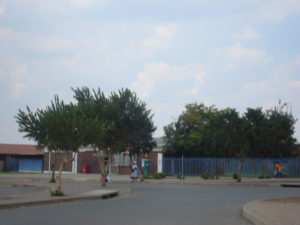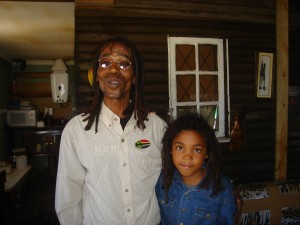
A redevelopment area

- Thandu and his son
Having just returned from South Africa, I reflected on the fact that I am privileged to travel there often to work with governments and businesses.
During my most recent trips to Cape Town, Johannesburg, Pretoria and Durban, I witnessed some of the major issues facing South Africa, including, poverty, health crisis, violence, and socio-economic problems as well as its political upheaval. This year was no exception, although, in the midst of the overwhelming crises, South Africa is currently experiencing hope and promise as it awaits the forthcoming economic stimulus anticipated with hosting the 2010 World Cup. South Africa cities are readying themselves knowing that they will have the eyes of the world focused on their country.
Today, electricity is in the air everywhere you go. Work is being done on transportation, greening, beautification, redevelopment, and modernization projects with a hope that South Africa will flourish with more tourism and business. In addition, there is a sense of hope for the world with our new President Barack Obama — South Africans clearly have the Obama spirit.
Last year while I was in South Africa, the xenophobia attacks broke out. I asked what had happened during the past year and was told the hatred-driven attacks had stopped. The xenophobia violence simply ceased and, because South Africa was so glad that it did especially in light of the upcoming 2010 World Cup nothing else was done to explore why it suddenly stopped and why it had started in the first place. How often in the United States do we have crises and once they’re over, nothing is done to examine the underlying causes or to determine if there were lessons to be learned.
I believe that South Africa struggles and hopes are not so different from those in the United States. When I returned home, we were facing similar issues including a flu epidemic, increased violence, severe homelessness, poverty, unemployment, and political unrest as well as celebrating President Obama’s 100 days in office and the anticipated rebirth of our nation.
I found myself contemplating that from one side of the world to the other, we are more alike than different. It brought to mind an old African adage, “I am, because we are.” In 2006, a young man named Thandu took me to Gugulethu, District 6 in Cape Town (an area where the seven children who fought against Apartheid were beaten to death by the police). He shared that Africans believe “People are people by virtue of other people…an injury to one is an injury to all…that we should not let circumstances circumcise our outlook on our lives.”
Both South Africa and the United States should embrace those wise words as well as question how can we learn from one another and share our experiences for the collective good.

Gloria Young has over 25 years of experience working in the public sector as well as being a management consultant to public and private organizations where she brings extensive practical experience in city and county government administration.
She has worked in all levels of government, formed excellent relationships with elected officials, and partnered with senior managers to provide leadership and visionary planning strategies and cultural diversity training for several communities. Gloria was an elected school board member for 13 years, served on numerous boards, and has received state and local recognition. She developed a Shadowing Program that has been adopted at the Gauteng Provincial Government in South Africa and in other public and private institutions in the U.S. and abroad. Ms. Young also developed a cultural diversity program entitled The Humanity/Advocacy Model (HA4). Her book “Knowledge Management Tales: Tale of Two Cities from San Francisco to Johannesburg” was published in 2008.








